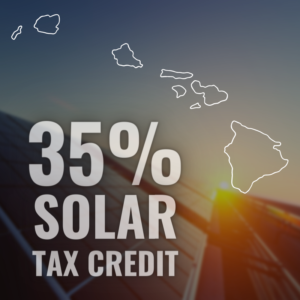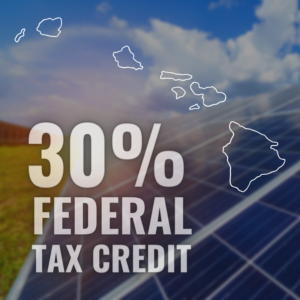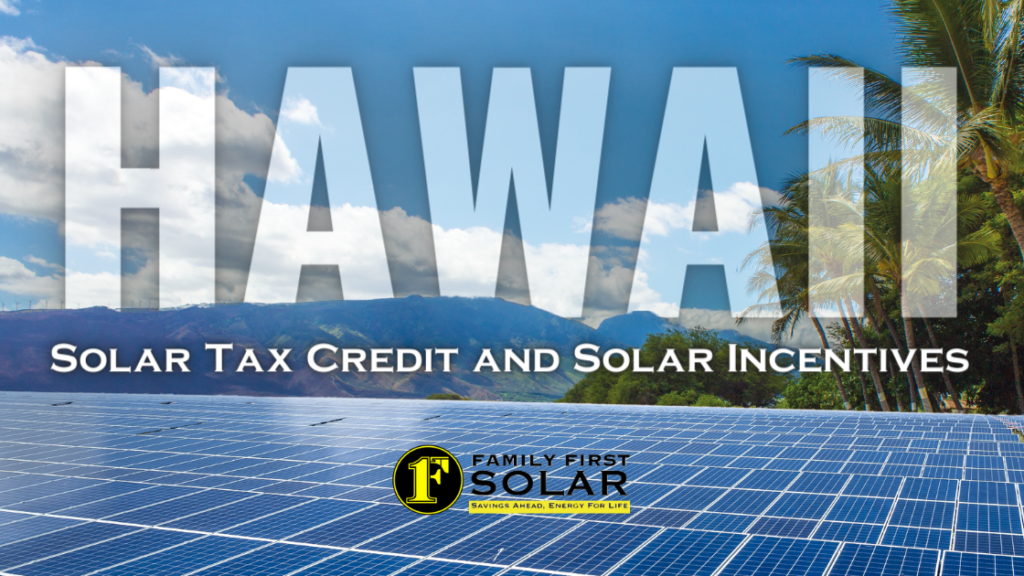Understanding the Hawaii Solar Tax Credit and Solar Incentives
If you’ve been thinking about getting solar panels installed on your home, there are lots of reasons to do it! But among the many advantages, the tax credits are certainly at the top of the list.
In this blog, we want to make sure you know about all the credits available to you so you can take advantage of them and save the most money possible. There are federal tax credits and state credits—so here’s what you need to know
Hawaii’s 35% Solar Tax Credit

Hawaii offers an incredible solar tax credit. (Just to be clear, we’ll use the terms “rebate” and “credit” interchangeably in this blog.) The State of Hawaii wants residents to switch to renewable energy, so they’re offering 35% back of the total install cost on your next yearly taxes.
Every part of your installation is included in this rebate including your solar panels, inverter, solar battery, other hardware, and labor costs. You’ll just need to claim the solar panels on your taxes, and be ready to provide proof of your contract and the paid invoice to the solar company.
Of course, the amount of the rebate is directly connected to the size and cost of the solar energy system you have installed. A larger home will need a larger residential solar system to cover their energy needs.
But, to put the tax credit into perspective, if you spend $12,000 on a solar power system, you’ll be getting $4,200 back from the state when you file your taxes.
Some people choose to put the money directly towards their solar loan, although obviously, it’s your money, so you can do whatever you please with it.
Net energy metering in Hawaii
If you’ve been living in Hawaii for around 10 years, you may already know that net metering came to a contentious end in 2015. The trouble was, net metering was so successful, that it wasn’t profitable for the utility company anymore to have solar users sending their excess solar energy back to the grid.
Because Hawaii has the highest amount of solar per capita, residents with solar were actually overloading the grid, causing unsafe circuits and grid disruptions. If you were aware of these happenings at the time, you might remember it was a very heated topic.
Since 2015, Hawaii Electric does not buy excess solar energy from residential solar systems with net metering. The good news for you is that battery storage allows residents to store excess energy and use it when their solar panels are actively collecting energy. This provides more reliable, and cheaper, energy for solar owners.
Net metering in Hawaii compared to other states
If you’ve moved recently from another state or are just savvy to the world of solar, you might know that in other states, net metering is quite popular and often a big incentive for people to go solar. The premise that the utility company pays residential solar users for the excess energy they create.
Most often, this payment comes in the form of a credit for the user to apply to their utility bill when they don’t create enough of their own solar energy to cover their own usage (like in the winter when the days are shorter or if it’s exceptionally cloudy.)
Are we missing out here in Hawaii by not having net metering anymore? We don’t really see it that way. Net metering keeps you tied to the utility company. With inflation, the ever-changing price of natural gas, and fickle regulations around net metering (see the recent net metering changes in California), we find Hawaii residents don’t miss net metering at all. The freedom from the utility company is well worth it!
Property tax exemption in Hawaii
Currently, Hawaii does not have a property tax exemption for solar panels as seen in other states. However, this doesn’t have a negative effect on Hawaii residents, since the state regulates that solar installations are not considered in property value assessments to begin with.
In other words, having solar panels installed on your home would not change the valuation of your property, so you would not have to pay additional property taxes on the increased value of your home (due to the addition of solar panels,) as is the case in other states.
Local Incentives for Installing Solar Panels
Since solar panels have been so widely adopted in Hawaii, there aren’t many other local incentives beyond the state solar tax credit. One rebate we did want to make you aware of that we consider to be a bad deal is the recent battery rebates from HECO.
Solar battery rebates
Since the death of net metering, HECO (Hawaii Energy Company) came up with another way to get energy from residential solar panels. There is currently an offer in place that might look good to solar owners, but it’s really not! If you talk to a solar salesperson that tries to convince you to buy more solar batteries because of this rebate, don’t listen!
Essentially, the utility will give solar owners a rebate for their solar batteries to be able to pull energy from your battery during peak hours. The result, however, is that homeowners end up paying extra to use energy from the utility during peak hours because their own solar energy is being drained.
Local incentives for solar water heaters
HECO is also providing a $1,250 instant rebate for new solar water heater installs. This makes the most sense for residents that don’t already have a solar array, because if you do, you likely don’t need a solar water heater. But if you do, you should definitely take advantage of this rebate.
Federal Solar Tax Credit

Hawaii residents installing a solar system should also take advantage of the federal solar tax credit. The Solar ITC, or solar investment tax credit, keeps getting sweeter! A recent change to the federal tax credit increased the credit amount to 30%. And this credit amount will remain at that rate until 2032, then it will decrease for a few years until it goes away in 2035 (unless Congress renews it.)
For the same $12,000 system we mentioned before, that means in addition to the $4,200 you’ll get back from the state, you’ll also get an additional $3,600 in federal tax credit. With both of these credits in hand, you’ll only owe $4,200 on your solar system until it was paid off. Then, you’ll be completely free of both a utility bill and a solar loan payment.
Summary of Hawaii Solar Incentives 2023
Hawaii truly is one of the best places in the country to have solar installed. Between our higher-than-average state tax credit, our incredible amount of sun, the lack of net metering, and the federal tax credit, having solar panels installed allows you the opportunity to save an incredible amount of money over the life of the solar system.
If you have questions about having solar panels installed at your home, we’d love to talk. Give Family First Solar a call at (808)724-4072 to get started.
Top Questions to Ask Your Solar Sales Rep
Learn what questions to ask and what to look for in a sales rep’s answers before you pull the trigger on solar! Download now!

12 Tips and Tricks to Keep Your House Cool During Summer in Hawaii
How Do You Keep Your House Cool in Summer’s Hottest Months? We love the weather

What’s a Solar Water Heater? Is it Worth the Cost?
Solar Powered Hot Water Heaters: Do They Save Money? When it comes to going solar,

What is Solar Powered Air Conditioning?
Cool Your Home with Solar Mini-Splits Solar powered air conditioning is a technology/appliance that some



Pingback: How Do Solar Panels Work in Hawaii? - Family First Solar